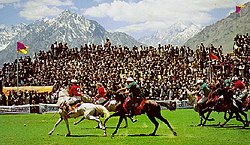Shandur Polo Festival
| Shandur Polo Festival شندور چوگان میلہ | |
|---|---|
 A polo match at Shandur | |
| Status | Active |
| Genre | Sports festival |
| Begins | 7 July |
| Ends | 9 July |
| Frequency | Annually |
| Venue | Shandur Top, Chitral Valley |
| Coordinates | 36°05′10″N 72°32′41″E / 36.0861°N 72.5446°E |
| Country | |
| Established | 1930 |
| Founder | Colonel Evelyn Hey Cobb |
| Previous event | 2023 |
| Next event | 2024 |
Shandur Polo Festival (Urdu: شندور چوگان میلہ) is a sports festival held annually from 7 to 9 July at Shandur Top in the chitral, of the Gupis-Yasin District of Gilgit-Baltistan. The polo tournament is played between the teams of Gilgit District and Chitral District, under freestyle rules.[1][2]
Organized and financed by Khyber Pakhtunkhwa Government, the tournament is held at Shandur Top which is the world highest polo ground at an altitude of 3,700 meters (the pass itself is at 3,800 meters). The festival also includes folk music, dancing and a camping village is set up.[3] The polo tournament is featured in the first episode of Himalaya with Michael Palin.
History
[edit]Polo is an equestrian sport first played in Central Asia in 6th century BC. Its objective was to train the cavalry and simulate a real-life battle.
The world’s highest polo ground is in the small village of Shindoor in Pakistan. Located at an altitude of 12,000 feet above sea level, the ground sits in the shadow of the towering Hindukash mountain range.
In 1935, UK Administrator for Northern Areas Evelyn Hey Cobb asked Balti Raja of Skardu, Ali Sher Khan Anchan, and Nambardar of Chitral, Niat Qabool Hayat Kakakhel, to construct a polo ground in Shandur, which was duly completed with the help of the local population. This polo ground was later on named as "Mas Junali". The word "Mass Junali" is derived from Khowar language. The word "Mas" means moon and "Junali" means polo ground.
Cobb was impressed by Kakakhail's resourcefulness and efficiency and wished to reward him for his service, but Kakakhail refused to accept any reward for his work. Instead, for the common benefit, Kakakhail asked Cobb to bring trout to stock the local streams. Cobb ordered live trout from England and dropped them into the Ghizer River. Due to this service, the Directorate of Fisheries was established and hundreds of people were employed. Now, the mass of those fishes in Hundarap Lake reaches 24 kg and in Baha Lake Khukush Nallah, their mass reaches 40 kg.[4][5][6][7][8][9] Therefore, Mas Junali became a source of connection between the people of Chitral District in Khyber Pakhtunkhwa and neighbouring Gilgit-Baltistan.
Tournament format and rules
[edit]Free-styled mountain polo is arguably polo in its purest form. This version of the game played at Shandur Top has attained legendary status and is of great interest to international and domestic adventure tourists alike. There are no umpires and there are no holds barred. In The Roof of the World, Amin/Willets/Tetley write: "by comparison, an American Wild West rodeo might pass for choir practice."[10] As one player once mentioned: "You can ride head-on into the opponent, if you dare."

In order to decide the final teams to play at the Shandur Polo Festival, preliminary matches are played both in Chitral and Gilgit, in which the best horses and players are chosen for the final games by the local juries. The festival begins on 7 July. During the course of the tournament A, B, C and D teams of Chitral and Gilgit battle it out on the polo field. Each team has six members with 2 to 4 reserve players in case of injury etc. The match usually lasts one hour. It is divided into two halves, with a ten-minute interval. During intervals, the locals enthrall the audiences with traditional and cultural performances. The game is decided in favour of the team scoring more goals. The final is held on 9 July.
The field measures about 200 meters by 56 meters (a regular polo field is about 270m by 150m), with 60 cm high stone walls running the length of the field on both sides instead of boards. As six players make up one side, the field can get fairly crowded. This has the advantage of slightly slowing down the pace, which, all things considered, is probably somewhat safety-enhancing. Players rarely wear helmets, the horses' legs often have no bandages, and mallets often have no grips or straps.
See also
[edit]References
[edit]- ^ "Shandur Polo Festival". www.tnn.com.pk. 18 June 2018. Retrieved 18 July 2018.
- ^ "Held on 7th to 9th July". Pamirtimes.net. 24 April 2018. Retrieved 18 July 2018.
- ^ Mulliner, Tim (2006). Ground Effect - an excerpt from T. Mulliner's book Long Ride for a Pie. ISBN 1-86966-135-4. Archived from the original on 20 February 2012.
- ^ The Pakistan Journal of Forestry. Pakistan Forest Institute. 1 January 1973.
- ^ Israr-ud-Din (2008). Proceedings of the Third International Hindu Kush Cultural Conference. Oxford University Press, 2008 - Reference - 540 pages. ISBN 978-0-19-579889-0.
- ^ Dawn. "GILGIT: Scouts accused of expanding encroachments".
- ^ pakistan tour and travel. "shandur festival".
- ^ express, tribune. "Rumble on the roof of the world".
- ^ Ground Effect - an excerpt from T. Mulliner's book Long Ride for a Pie Archived 2012-02-20 at the Wayback Machine ISBN 1-86966-135-4
- ^ Amin, Mohamed; Willetts, Duncan; Tetley, Brian (1992). The Roof of the World (1st ed.). Hunter Pub Inc. ISBN 978-1869828059.
Further reading
[edit]- Khan, Aurangzaib. "How teams compete for the Shandur Polo Festival". Herald.
- "Shandor Polo Festival".
- "Shandor Polo Festival Details".
